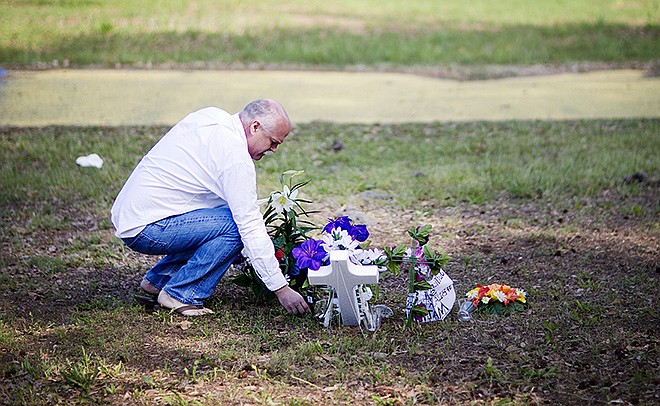NORTH CHARLESTON, S.C. (AP) - There is almost nothing in Michael Thomas Slager's police personnel file to suggest that his bosses considered him a rogue officer capable of shooting an unarmed man in the back. People in the community he served said Thursday that this is precisely the problem: Officers rarely face consequences when citizens complain.
In his five years with the North Charleston Police, supervisors consistently gave positive performance reviews to the officer now jailed for murder in the shooting of an unarmed black man in the back. Slager had claimed self-defense, but he was swiftly charged and fired this week after the dead man's family released a bystander's video showing him shooting Walter Lamer Scott eight times as he ran away.
Slager's file includes one excessive use-of-force complaint: A man said Slager used his stun gun against him without reason in 2013. But the case was closed, exonerating Slager, even though witnesses told the Associated Press investigators never followed up with them.
As a steady crowd left flowers, stuffed animals, notes and protest signs Thursday in the empty lot where Scott was gunned down, many people in South Carolina's third-largest city said police routinely dismiss their complaints of harsh treatment, even when eyewitnesses are available to attest to police misbehavior.
Residents say they've experienced so much petty brutality and harassment they regard officers with a mixture of distrust and fear.
"We've had through the years numerous similar complaints, and they all seem to be taken lightly and dismissed without any obvious investigation," the Rev. Joseph Darby, vice president of the Charleston branch of the National Association for the Advancement of Colored People, said Thursday.
Slager's new attorney, Andy Savage, said Thursday he's conducting his own investigation into Saturday's shooting. His statement added it's "far too early for us to be saying what we think."
Slager's original attorney, David Aylor, bowed out after asserting Slager had followed all proper procedures before using deadly force, a version that quickly unraveled after the video came out. The former officer, whose wife is eight months pregnant, is being held without bond pending an Aug. 21 hearing.
Mario Givens, who alleged two years ago that Slager repeatedly and unnecessarily caused him excruciating pain with a Taser, told the AP Wednesday that no one sought his version before Slager was "exonerated."
"They never told me how they reached the conclusion. Never. They never contacted anyone from that night. No one from the neighborhood," Givens said.
Givens said he's convinced Scott's death could have been prevented: "If they had just listened to me and investigated what happened that night, this man might be alive today."
Darby also wonders if Saturday's fatal shooting might have turned out differently had the department thoroughly investigated the 2013 Taser complaint.
"I think he would have been rebuked instead of fired," Darby said. "But maybe it changes the way he sees things."
Darby and other civil rights leaders want North Charleston to create an independent citizens review board to review complaints against police, since "law enforcement is going to almost always give itself the benefit of the doubt."
Such boards are few and far between in South Carolina.
North Charleston police spokesman Spencer Pryor said Wednesday the department now plans to review Givens' complaint, although he wouldn't say what difference that could make now.
Givens, 33, told the AP Slager woke him before dawn one morning by loudly banging on his front door, and saying "Come outside or I'll tase you!"
"I didn't want that to happen to me, so I raised my arms over my head, and when I did, he tased me in my stomach anyway," Givens said.
Slager wrote in his report, obtained by the AP through a public-records request, he could not see one of Givens' hands and feared he might be holding a weapon.
As it turns out, Givens' arrest was a case of mistaken identity. After witnesses said he was tased, dragged outside, thrown to the ground, tased again, handcuffed and accused of resisting arrest, he was released without charge.
"It was very devastating," said Bessie Givens, 57, who was awakened by her son's screams. "You watch your son like that, he's so vulnerable. You don't know what's going to happen. I was so scared."
Related video report:

